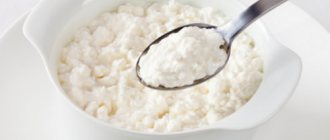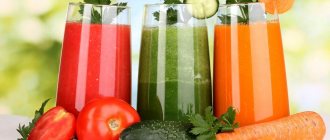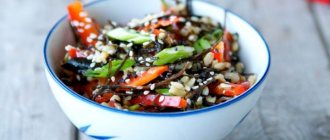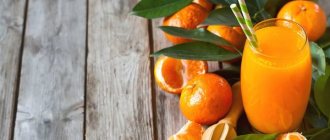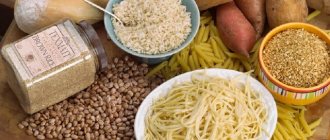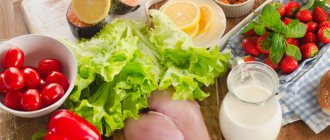What is the right way to start the day, proteins or carbohydrates? There are several opinions on this matter. Since childhood, we have been taught that we need to eat porridge in the morning, because it gives us energy for the whole day. However, today an alternative opinion has emerged, according to which it is better to consume protein foods for breakfast. This theory appealed to bodybuilders, for whom protein is the best product for muscle growth. And some even believe that there is no need for breakfast, since they feel great without it.
Carbohydrates in the morning proteins in the evening menu
Fruits are quickly digestible, but not immediately after lunch. It’s time to taste an apple or pear half an hour before a meal or 1 hour later. Without a doubt, these are fish and meat. The daily protein requirement for a person is approximately g. The norm for dietary nutrition is reduced to 80 g. Vegetables speed up the process of digesting animal food. The percentage of absorption of fish ranges from 93 to 98, meat - reaches List of products containing large amounts of protein: cheese, dairy products, eggs, legumes.
It is advisable to consume protein at a time when there is a shortage of energy in the body. The fact is that it is a kind of catalyst for metabolic processes. Therefore, it is preferable to eat protein foods for dinner. But even if you eat such foods two or three times a day, it will not harm the body in any way. Once ingested, fats, just like carbohydrates, fully compensate for energy costs.
Performs protection and thermal insulation functions. Provide softness, elasticity and waterproofness of the epidermis. They are carriers of the taste of food products. However, excessive consumption leads to incomplete absorption, therefore, fat deposits will appear.
Experts have approved a list of foods that increase blood cholesterol levels. This includes butter, vegetable oil, lard, meat, peanuts, nuts, olives and other products.
If possible, reduce their consumption, but do not completely abandon them. Nutritionists recommend not consuming fats and carbohydrates in large quantities at the same time. As stated earlier, it is better to eat carbohydrates before lunch, and fats in the late afternoon. They will saturate the body with energy and essential microelements. Sugar and fats are present in moderation in the diet. When choosing foods, consider the calorie content, but remember the nutrients. Control your fluid intake.
It is a regulator of the activity of internal organs and an energy source. The norm per day is approximately 2-2. Consumption of liquid in a larger volume leads to the destruction of water-salt balance. It is important to drink water on an empty stomach before eating. Will help you avoid feeling hungry. If you are thirsty, unsweetened herbal tea or warm water will come to the rescue.
Black tea is not the best solution, as it contains tannin, which inhibits the digestion of food.
Coffee and soda are not a substitute for water. Alcohol leads to dehydration. Freshly squeezed fruit juices are beneficial, but not drinks from store shelves. Don't be cruel to your body. A high content of sugar and preservatives is a direct path to extra pounds and intestinal and stomach diseases. Compote, juice, tea, jelly, fruit drink are a worthy and healthy replacement for a carbonated drink. Serve to activate internal organs. Nutritionists say that the ideal breakfast contains foods rich in protein and carbohydrates.
Both lunch and breakfast consist of protein foods and foods rich in carbohydrates - soups, vegetables, pasta, fish and meat. For dinner, the body should receive only proteins: meat, fresh vegetables, fish, vegetable oil.
Low-calorie foods are relevant for a balanced diet. The portion for men is g, for the weaker half - g less. Don't get carried away with pasta and potatoes, white bread. Avoid fried foods, sausage sandwiches, mayonnaise and chocolate.
Three steps to the perfect menu
Eat vegetables raw, as well as steamed, baked or boiled. Without a doubt, it is not good to completely give up fatty and fried foods. Every day a person needs 1 g of fat per 1 kg of normal body weight. Cooking in a non-stick pan is a way to reduce the fat content of your food. Adding liquid when sautéing vegetables will reduce the amount of fat consumed.
Place fried pies and fish on a paper towel. Use yogurt instead of mayonnaise. Oil and lemon juice for salads are the optimal dressing. A proper combination of fats, proteins and carbohydrates in the diet is the basis of proper nutrition.
It is advisable to adhere to the following rules:. If you adhere to the regime and basics of a balanced diet, you will not only be able to have a beautiful figure, but also take full care of your health. In addition, you will gain confidence, success and cheerfulness. The basis of proper nutrition is proteins, carbohydrates, fats, consumed in the correct proportions, as well as their correct distribution throughout the day.
It turns out that the absorption of certain foods depends on the time of day. Today we will talk about when and why it is better to eat carbohydrates and when to eat proteins.
In recent years, a healthy protein-carbohydrate diet for weight loss has become very popular - a method of getting rid of extra pounds by alternating foods with a high content of proteins and carbohydrates. It satisfies the daily needs of the human body for all necessary substances, and the feeling of hunger does not occur. The weight is lost very well, albeit slowly, and then does not return.
Many people know that proper nutrition in the morning, carbohydrates in the evening, proteins, provides the best metabolism, and also reduces the likelihood of weight gain. Protein plays an important role in the development of muscle tissue and is also an essential material for the functioning of the body. Eating enough protein will provide us with healthy shiny hair, beautiful skin, and good, unbreakable nails.
That is why proper nutrition with proteins and carbohydrates involves eating protein foods in the morning at lunch and in the evening. If you reduce protein foods in your diet, then many vitamins, for example B12, will not be supplied. Protein can be of either animal or plant origin. Proper nutrition requires both. An adult needs a considerable amount of protein per day, depending on the type of activity and body type, from 50 to grams.
But many may confuse pure proteins with protein-containing products. For example, a gram of protein-rich soybeans contains only 35 grams of protein, and a gram of chicken contains 20 grams. If you are going to stick to a healthy diet of proteins and carbohydrates, then you should know that it is best to eat foods high in protein but low in fat. Here is an example of protein-rich and healthy foods: Let's figure it out. In the morning, carbohydrates are easier to digest and also provide energy.
But not all carbohydrates are created equal. Carbohydrates can be divided into 2 groups: fast and slow, or as they are also called simple and complex. The latter include whole grain bread products, dry beans and peas, uncooked fruits, green vegetables, tomatoes, dairy products and beans. These products are useful to eat both for breakfast and throughout the day, with the exception of dinner. They will provide you with energy for a long time, and the feeling of hunger will not come as quickly as after a snack with fast or simple carbohydrates.
These include: sugar, white bread, baked goods, refined rice, white and milk chocolate, bananas, melons, sweet carbonated drinks, honey, most sweet confectionery products.
Switch to English registration. Phone or email. Another's computer. View topic 39
These products are not suitable for dietary nutrition. For example, sugar and bread should be excluded altogether; as for honey, eat bananas and melons in reasonable quantities, preferably on days when you have high energy expenditures. Fast carbohydrates can be consumed in the first half of the day, but preferably for the second breakfast, since they will interfere with the production of insulin during the first meal. Proper nutrition in the morning, carbohydrates in the evening, proteins means that carbohydrates are most easily digested in the morning, but this does not mean that protein foods should be excluded for breakfast.
At the same time, in the evening, we do not need carbohydrates, as well as excess energy, and protein is more beneficial for our body. As we can see, proteins and carbohydrates play an important role in proper nutrition, and in order for them to be as healthy and nutritious as possible, you should remember which foods to eat and at what time. Eat carbohydrates in the morning, proteins in the evening? What can this give us? Is this the right approach if you are losing weight? We'll figure out.
And only then, for lunch, for example, in a children's camp, we were given a side dish with meat, and in the evening there was little side dish and again a protein product.
If you look at the nutrition that was and is recommended in children's health camps, it turns out something like this: a carbohydrate load in the morning, and a protein load in the evening.
You can also notice that on the Internet, many famous athletes who talk about their diet just have cereal for breakfast, and in the evening they give up carbohydrates, and they have protein meals in the evening.
Maximum with salad. In my free training, and in my book, and in articles, I try to make people understand the importance of BJU Balance and caloric intake depending on their goals.
Calorie content is not so important, but still an important thing. And when a person calculates his BJU balance, he does not quite understand when and how to distribute it throughout the day among meals.
I'm considering losing weight. If you closely follow blog updates or are at least aware of my articles, then you should remember the principles of more effective fat burning, morning workouts, depletion of glycogen stores overnight, etc.
Carbohydrates are our energy. It tends to be delayed. At night, our body also needs it. We breathe, maintain body temperature, etc. Anabolic and catabolic processes occur in the body. If you effectively spend all the energy you receive from food, you will not gain weight. For weight loss, it is much more effective to exercise in the morning. Then you engage in sports, which also require energy and your body takes it from reserves. So, when you know in numbers how much you should eat according to the balance of BJU per day in order to lose weight, you immediately try to distribute it into 3 or meals.
So, an approach of carbohydrates in the morning in the evening and proteins is really better than even an even distribution of carbohydrates and proteins throughout the day. Protein gives you a longer feeling of fullness. And you will not replenish glycogen stores until the morning, which will make the process of night and morning fat burning even more effective.
If you have an apple shape. On the contrary, you can’t eat carbohydrates before 5 pm. And only after five should you touch carbohydrate foods. Carbohydrates in the morning in the evening, proteins - there is even such a system. I haven’t seen it on the Internet and I haven’t really looked for it, to be honest, for an explanation of why this is so. A person generally loses weight in his sleep, no matter how he eats.
Carbohydrates and their role in the diet
Nutritionists unanimously insist that carbohydrates are consumed strictly before lunch, because this kind of fuel allows all organs to function properly throughout the day. It is advisable not to overdo it with their intake, because excess carbohydrates do not have time to be absorbed by the body, which leads to fat deposits on the hips, waist, shoulders and other problem areas.
Cereals are an accumulator of carbohydrates. Their lack leaves a negative imprint on the mood. Fiber and fiber are required to improve digestion. Cereals are made from grain crops. Cereal porridges made from buckwheat, oats and rice are especially appreciated. They have a beneficial effect on the body and prolong life.
Of course, if you decide to gain weight, then, of course, you need carbohydrates after lunch. And in no case should you eat pasta, cereals, fruits, alcohol before bed, otherwise you will have to forget about a slim figure. Proper nutrition: proteins, fats, carbohydrates, table in the morning, afternoon, evening - this is the key to effective results.
Sweets in limited quantities
Carbohydrates will certainly have an excessive impact on your health: diabetes, cardiovascular disorders, joints, and excess weight problems. There is a chance of infertility, blurred vision and weakened intelligence. A visit to the dentist is mandatory. Excessive consumption of carbohydrates has a negative impact on the functioning of the gastrointestinal tract. Appearance and beauty are at risk.
The second half of the day is not quite the right time for sweet and starchy treats. If you really want confectionery, try to eat it before lunch: not every day and within reasonable limits. Replace sweets with dried fruits, marshmallows or marmalade.
The place of vegetables and fruits in a balanced diet

They occupy about 40% of a person’s menu. Contains vitamins and minerals. Responsible for the vital functions of the body. Inclusion in the menu for every day ensures the prevention of diseases and increases immunity. Stimulate digestive processes, metabolism and absorb harmful and toxic substances. Their deficiency has a negative impact on performance, appearance and longevity.
Fruits are quickly digestible, but not immediately after lunch. It’s time to taste an apple or pear half an hour before a meal or 1.5 hours after a meal.
Diet: carbohydrates in the morning, proteins in the evening
This is physiology. It is at night that the processes of restoring muscle fibers, burning fat, etc. are more effective. A lot of research confirms this. Their results are available in open sources on the Internet. Read it if you're interested. I would recommend that those who are losing weight distribute the BJU Balance exactly this way: carbohydrates in the morning - proteins in the evening. But not in absolute terms. This is not a panacea for everyone. Proper nutrition is individual for everyone. But, with a high degree of probability, carbohydrates in the morning and protein will help you lose weight more effectively.
At night you sleep, don't think and don't move. Obviously, you burn fewer calories than during the day, even if you're just sitting on the couch. In addition, exercise increases the metabolic rate during sleep, which leads to greater fat oxidation 3. But comparing any meal with the morning is not entirely correct, because in the morning insulin sensitivity is much higher due to overnight fasting. Fortunately, a recent study conducted at the Hebrew University of Jerusalem and published in the journal Obesity examined the issue of evening carbohydrates.
Both groups were put on the same calorie deficit for six months with the same amounts of protein, carbohydrates and fat. What to eat for a snack in the first half of the day: fruit, cracker with tea, a handful of dried fruits or berries, nuts, honey. What to snack in the afternoon: vegetables, cottage cheese, fermented baked milk, yogurt, kefir, cheese.
There is a very simple, tasty and satisfying salad with any proportions: cut fresh tomatoes into small cubes, add cottage cheese, chopped herbs, a little salt and a drop of olive oil. Mix all ingredients. Dill works very well for this salad, and basil is even better.
Having a snack with this salad will perfectly satisfy your hunger. The same salad, only without oil, is perfect for dinner. Tip 5: Be sure to drink clean water throughout the day. It is better to drink water 20-30 minutes before meals, and no earlier than 1 hour after meals. Tip 6. If you don't have the opportunity to eat normally during the day, stock up on small plastic containers for each meal.
At first it will not be very convenient for you to collect them and carry food with you. But very soon you will get used to the fact that you always have a healthy snack at hand and do not need to go to the supermarket during your lunch break to buy cutlets from the culinary section. Tip 7. Don't overeat at night, but don't go to bed on an empty stomach. About an hour before bedtime, drink a glass of kefir, tea with lemon balm or mint.
If you're hungry, eat a raw carrot, cucumber, celery, green apple, or a piece of cheese. In case of severe hunger, this happens at first, while you get used to a new way of eating, boiled meat helps out very well. There are no carbohydrates in it, and you don’t have to be afraid that you will put on something in the form of an extra kilogram. Tip 8. Don't overeat, even if it's your favorite treat. Do not eat until you feel heavy and short of breath. We often ask ourselves the question: how much should we eat at one meal?
The fact is that all people are individual. The main cause of excess weight is banal overeating. A distended stomach can accommodate two, three or more servings. For such a person, not overeating means eating a little less than usual and feeling slightly hungry after eating.
So start by reducing your portions. It is important to consider the calorie content of a serving. For example, grams of fish soup contain from 30 to 50 kcal, and grams of cervelat - about kcal. Armed with knowledge, start planning your diet. Now only your favorite dishes and minus excess weight. Let's leave starvation diets in the past and start a new day with a smile! Knowing how difficult it can be for a beginner to navigate, I suggest you take as a basis a ready-made nutrition plan, which is designed for kcal per day.
You can create your own menu for every day, adjusting the regime to suit you, add your own workouts or light exercises in the morning if you wish, list each meal by calorie content and grams, come up with options for breakfast, lunch or dinner. Many people think that the UC diet is the one written on the internet where there is grapefruit on protein days. BUT: the point of the diet is in alternation, in contrast.
The stronger the contrast between protein and carbohydrate days, the better the result.
The essence of the technique
The program appeared in sports circles, where keto nutrition quickly gained popularity. It is based on an almost complete rejection of carbohydrates, shows high results, but has a number of disadvantages. The protein-carbohydrate diet, or protein-carbohydrate alternation (BUC for short), included the advantages of a carbohydrate-free diet, but minimized its disadvantages.
The technique consists in the fact that a person alternates carbohydrate-free days with carbohydrate days according to a certain pattern (of which there are several). For what?
The first stage – a lot of protein, no carbohydrates – forces the body to part with its “stash”. Metabolism is still fast due to inertia; glycogen reserves (carbohydrates stored in the body) from the liver and muscles are used. The next day they have already dried up, and fat begins to be spent on energy supply, which is what we are trying to achieve.
And then the wise organism understands that hunger has set in. And in order to survive in conditions of deficiency for as long as possible, it suspends all metabolic processes.
This is a complex reaction, it manifests itself not only in the fact that fat is now burned more slowly. In particular, there is also nutrition of the brain to the detriment of other organs.
This is why people on a diet can feel unusual mental clarity and a complete reluctance to move. Many feel drowsy, tired out of nowhere, and lack the energy for sports and leisure activities.
To avoid the introduction of an “economy mode”, a second stage is provided on the protein-carbohydrate diet: a carbohydrate day. There are a lot of calories, a lot of carbohydrates, the body relaxes - the hunger is over. On this day, almost no fat burning occurs, but the speed of metabolic processes is restored. And when we return to stage 1, everything will repeat with the same intensity.
Protein-carbohydrate diet for weight loss: how to create a menu and get out of it correctly
You can also have a cucumber a day. If you eat nuts and cheese, which are also protein products, the fat in the body will be burned worse, since the body will use fats from the products as energy. But you need to force him to process his own fat. This can be done by eating protein foods. Cottage cheese contains 18 g of protein, chicken. If you visually have a lot of excess fat, take less than your current weight.
Counting protein on protein days is easy, you just need to do it a day. Then this is done automatically and in the mind - all the products. They also often ask whether it is possible to increase the number of protein days to achieve better results. I advise you to do protein every day, but no more. If it’s more, then immediately go on a carbohydrate-free diet. From 4 or more protein days, the result will not be much better than from Although every body is different.
But purely psychologically and physically, and for me personally, protein in the day is more effective. Now about the carbohydrate day: don’t worry about the calculation at all, but just eat healthy carbohydrates all day, except in the evening. In the evening - protein. Eat without overeating. The emphasis is on complex coals of porridge-pasta-vegetables, fruit in the first half of the day, you can eat protein at lunch.
Answer to a frequently asked question: mixed day cannot be removed, otherwise the effect will be less. It’s also not worth increasing the number of carbohydrate days. Snack: 1 whole egg and 1 egg white. Lunch: tuna with cucumbers. Snack: fruit. Lunch: 4 tbsp. Dinner: Protein.
Pros and cons of BUD
Alternating such days has its positive sides. These include:
- The ability to lose weight smoothly and steadily. The weight comes off gradually, and at the same time you eat without being hungry. The body does not experience a calorie deficit and loses weight by burning fat, rather than losing valuable water (as happens during fasting).
- There is no need to constantly count calories. You eat whatever you want, but from the list of carbohydrate or protein foods.
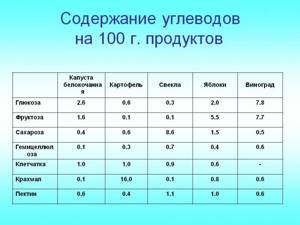
- The ability to combine proper nutrition with active physical activity.
- No feeling of hunger, which means no overeating. Both proteins and carbohydrates saturate the body well, even in small portions.
- Accustoming the body to life without harmful products. On such a diet you simply don’t want them.
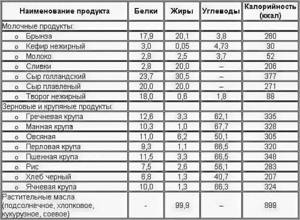
BUDs also have disadvantages. But compared to the advantages, they are not significant:
- A number of contraindications to nutrition;
- The need to actively train, otherwise the carbohydrates you eat will be deposited in problem areas (albeit little by little);
- The possibility of constipation in the absence of sufficient water and fiber in the body.
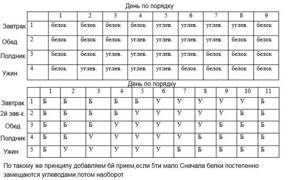
Please note that due to the high amount of protein in the body, you may experience a slight feeling of nausea, an unpleasant taste and odor in the mouth. If the symptoms are very obvious and bother you, then it is better to refuse such food.
Recipes
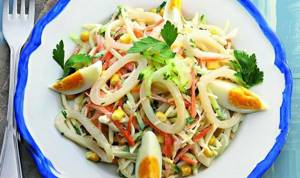
Special recipes for salads, first and second courses will help you fill the menu of a protein-carbohydrate diet.
Salads
Recipe No. 1. Protein egg salad
Ingredients:
- bulb;
- breast 200 gr;
- squid 200 gr;
- eggs 4 pcs;
- powder mustard 10 gr.
Preparation:
- Boil the eggs soft-boiled.
- Boil the breast. Cut into strips.
- Boil the squid. Cut into strips.
- Mix onion, eggs, mustard in a blender.
- Dress the salad.
- Mix everything.
Recipe No. 2. Carbohydrate honey-cabbage salad
Ingredients:
- fresh cabbage 300 gr;
- sugar 10 g;
- lemon juice 15 ml;
- rhubarb juice 40 ml;
- honey to taste.
Preparation:
- Shred the cabbage.
- Grind it until the juice comes out.
- Add all other components.
Recipe No. 3. Protein-carbohydrate salad
Ingredients:
- squid 150 gr;
- cucumber;
- chicken breast 100 g;
- lettuce 2 leaves;
- dill sprig.
Preparation:
- Boil squid and chicken breast until cooked.
- Chop them with chopsticks.
- Cut the cucumber in the same way and add to them. Mix.
- Place lettuce leaves on a plate.
- Decorate the salad beautifully.
- Top with chopped dill.
First courses (soups)
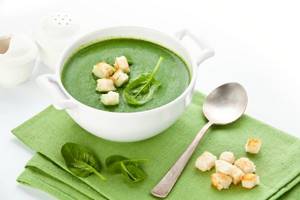
Recipe No. 1. Protein soup with spinach
Ingredients:
- turkey 400 gr;
- spinach 100 gr;
- garlic 2 cloves;
- milk 100 ml;
- seasonings to taste.
Preparation:
- Boil the meat, remove from the water, cool, remove the bones, chop, return to the broth.
- Chop the spinach and cook with the meat for 10 minutes.
- Puree the mixture using a blender, adding milk in small portions.
- Sprinkle with spices.
- Serve hot.
Recipe No. 2. Carbohydrate potato and sour cream soup
Ingredients:
- green onions, dill;
- potatoes 400 gr;
- carrot;
- petiole celery 1 stalk;
- celery root 100 gr;
- vegetable broth 3 l;
- sour cream 250 gr;
- lemon juice 50 ml;
- seasonings
Preparation:
- Peel the vegetables, chop and boil.
- Add sour cream.
- Cook until creamy consistency.
- Season with juice, chopped herbs, and seasonings.
- Serve hot.
Recipe No. 3. For a mixed day. Lentil and chicken soup.
Ingredients:
- lentils 250 gr;
- bulb;
- water 5 l;
- chicken fillet 400 gr;
- celery root 100 gr;
- carrot.
Preparation:
- Boil the fillet.
- Add lentils to the broth.
- After 10 minutes, add chopped vegetables.
- After 20 minutes - chicken, cut into strips.
Second courses
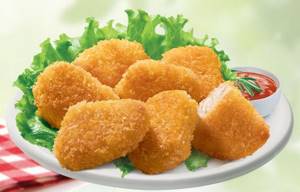
Recipe No. 1. Protein chicken nuggets.
Ingredients:
- oat flour 25 gr;
- chicken fillet 500 gr;
- eggs 2 pcs;
- seasoning to taste.
Preparation:
- Make nuggets from the fillet. Hit it with a hammer.
- Beat eggs, mix with flour and seasonings.
- Roll the nuggets in breading.
- Bake in the oven until done.
Recipe No. 2. Carbohydrate nutrition. Vareniki.
Ingredients:
- potatoes 500 gr;
- cabbage 200 gr;
- bulb;
- flour 250 gr.
Preparation:
- Knead the dough.
- Finely chop the cabbage.
- Put it out.
- Fry chopped onion.
- Boil mashed potatoes.
- Mix cabbage, mashed potatoes, onions.
- Make, fill, boil dumplings.
Recipe No. 3. Mixed nutrition. Curry.
Ingredients:
- brown rice 250 gr;
- chickpeas 100 gr;
- beef 400 gr;
- curry to taste;
- carrot.
Preparation:
- Soak the chickpeas for 12 hours.
- Boil rice and chickpeas separately from each other.
- Cut the beef into strips.
- Grate the carrots.
- Stew carrots and beef until half cooked.
- Add everything else to them. To fill with water. Stew.
With such recipes, a protein-carbohydrate diet will not be like a hunger strike and will help you get through the weight loss period easily and tasty.
conclusions
Based on reviews, a protein-carbohydrate diet is a way to get rid of not only a couple of kilos, which are not enough to be ideal, but also a lot of excess weight. Get examined, rule out contraindications (diseases of internal organs, metabolic disorders) and feel free to proceed. Perhaps this is your way to change your life.
Reader’s story “How I lost 18 kg in 2.5 months” I’ve been fat all my life and suffered from excess weight. In clothing stores I chose size L, which by the age of 25 turned into XL and continued to grow. I can tell you for a long time how I tried to fight my 30-35 extra pounds: diets, hunger strike, physical activity, even pills and some kind of conspiracies. The effect was short-lived or absent altogether. In short, despair, depression and almost resignation to one’s enormous weight. But one day I came across... a chocolate bar that helps you lose weight! It didn’t cost me anything to try it - I love chocolates. I ordered it and ate it. And the weight crept down!! It seems like mysticism, but it's true. I began to study the issue and realized how it all works. Girls, try it! I have already lost 18 kg in 2.5 months. And I continue. It's up to you, but you don't lose anything except weight, of course. Try Choco Burn chocolate for weight loss for 147 rubles.
